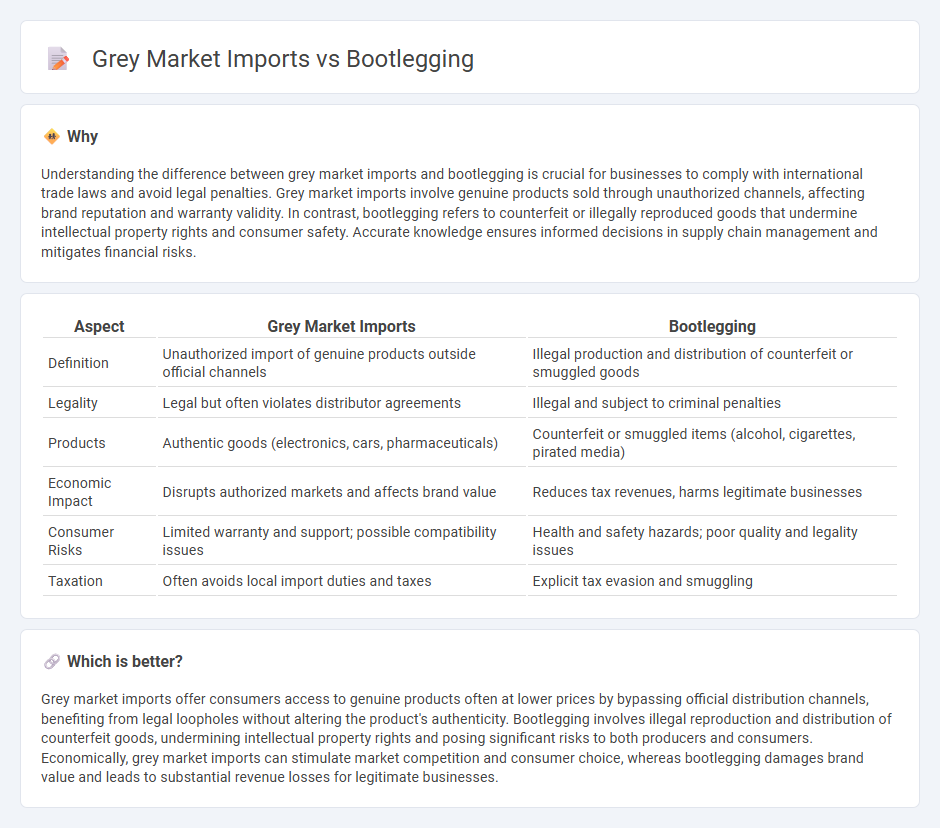
Grey market imports refer to genuine products imported through unauthorized channels, often offering lower prices due to bypassing official distribution networks. Bootlegging involves the illegal production and sale of counterfeit goods, undermining intellectual property rights and causing significant economic losses. Explore the nuances between these practices and their impact on global markets to understand their economic implications better.
Why it is important
Understanding the difference between grey market imports and bootlegging is crucial for businesses to comply with international trade laws and avoid legal penalties. Grey market imports involve genuine products sold through unauthorized channels, affecting brand reputation and warranty validity. In contrast, bootlegging refers to counterfeit or illegally reproduced goods that undermine intellectual property rights and consumer safety. Accurate knowledge ensures informed decisions in supply chain management and mitigates financial risks.
Comparison Table
| Aspect | Grey Market Imports | Bootlegging |
|---|---|---|
| Definition | Unauthorized import of genuine products outside official channels | Illegal production and distribution of counterfeit or smuggled goods |
| Legality | Legal but often violates distributor agreements | Illegal and subject to criminal penalties |
| Products | Authentic goods (electronics, cars, pharmaceuticals) | Counterfeit or smuggled items (alcohol, cigarettes, pirated media) |
| Economic Impact | Disrupts authorized markets and affects brand value | Reduces tax revenues, harms legitimate businesses |
| Consumer Risks | Limited warranty and support; possible compatibility issues | Health and safety hazards; poor quality and legality issues |
| Taxation | Often avoids local import duties and taxes | Explicit tax evasion and smuggling |
Which is better?
Grey market imports offer consumers access to genuine products often at lower prices by bypassing official distribution channels, benefiting from legal loopholes without altering the product's authenticity. Bootlegging involves illegal reproduction and distribution of counterfeit goods, undermining intellectual property rights and posing significant risks to both producers and consumers. Economically, grey market imports can stimulate market competition and consumer choice, whereas bootlegging damages brand value and leads to substantial revenue losses for legitimate businesses.
Connection
Grey market imports and bootlegging both involve the unauthorized distribution of goods outside official channels, undermining legitimate trade and tax revenues. Grey market imports typically refer to genuine products sold through unofficial or unauthorized channels, while bootlegging involves illicitly produced or counterfeit goods. Both practices distort market prices, reduce government tax collections, and contribute to economic inefficiencies in the formal economy.
Key Terms
Intellectual Property Rights
Bootlegging involves the unauthorized production and distribution of goods that infringe on Intellectual Property Rights (IPR), often bypassing legal channels and exposing consumers to counterfeit products. Grey market imports refer to genuine goods imported through unauthorized but legal channels, sometimes challenging trademark protections but not directly violating IPR. Explore the finer distinctions between these practices and their impact on Intellectual Property Rights enforcement for comprehensive understanding.
Parallel Importation
Bootlegging involves the unauthorized distribution of copyrighted goods, often violating intellectual property rights, while grey market imports, also known as parallel imports, refer to genuine products imported through unofficial channels without the permission of the trademark owner. Parallel importation exploits price differences across regions, allowing consumers access to authentic products at lower costs but can lead to warranty and service challenges. Explore the nuances of parallel importation to understand its impact on global trade and consumer rights.
Counterfeit Goods
Bootlegging involves unauthorized reproduction and distribution of counterfeit goods, often violating intellectual property rights and creating significant economic losses for original manufacturers. Grey market imports refer to genuine products imported through unauthorized channels, potentially bypassing official distribution networks and warranties, yet they are not counterfeit. Explore the distinctions further to understand how these practices impact consumer safety and brand integrity.
Source and External Links
Bootlegging | EBSCO Research Starters - Bootlegging refers to the illegal manufacture, distribution, or sale of alcoholic beverages, a term dating back to the 1880s and widely recognized during the U.S. Prohibition era from 1920 to 1933, which spurred organized crime and illegal alcohol trade.
Bootlegging | Definition, History, & Facts - Britannica - In U.S. history, bootlegging describes the illegal traffic in liquor during Prohibition, involving smuggling from foreign sources and evading law enforcement, with the term originally referencing concealment of liquor in boot tops during the 1880s.
Rum-running - Wikipedia - Rum-running, or bootlegging, is the illegal smuggling of alcoholic beverages primarily by water or land, persisting beyond U.S. Prohibition with ongoing illicit activity and tax evasion related to alcohol across various regions.
 dowidth.com
dowidth.com